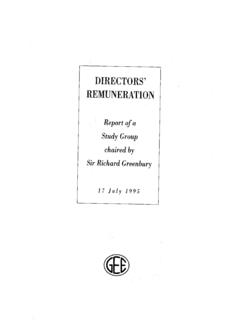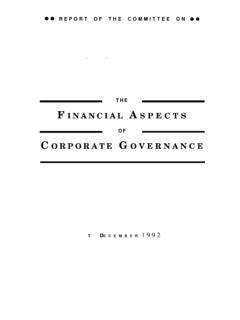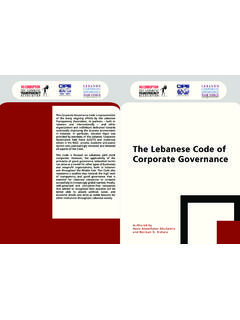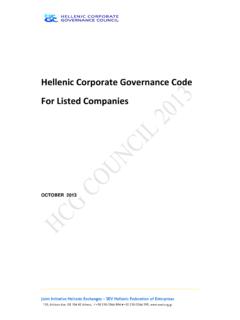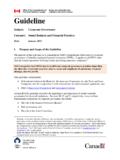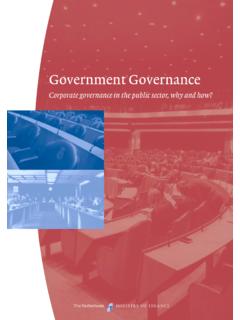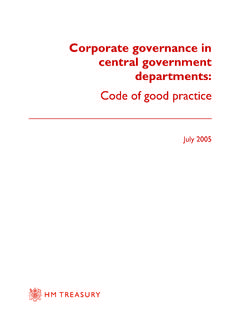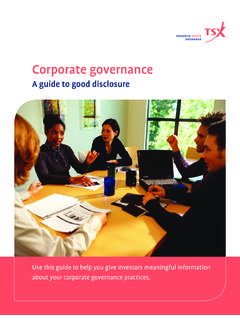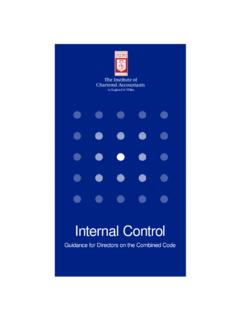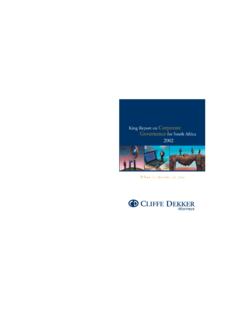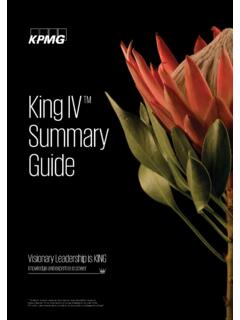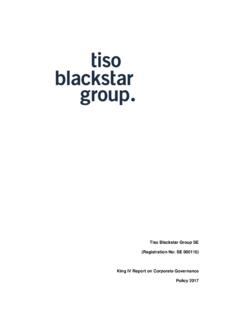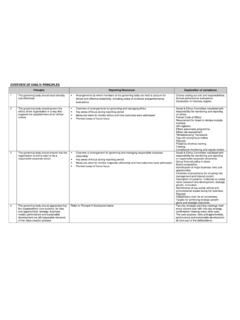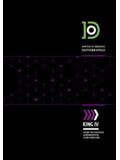Transcription of EXECUTIVE SUMMARY of the KING REPORT 2002
1 EXECUTIVE SUMMARY of the king REPORT 2002 king COMMITTEE ON CORPORATE GOVERNANCE LOGO : PROUDLY SOUTH AFRICAN MARCH 2002 Page 2 COPYRIGHT INSTITUTE OF DIRECTORS IN SOUTHERN AFRICA Copyright in this EXECUTIVE SUMMARY of the king REPORT 2002 rests with the Institute of Directors in Southern Africa. Apart from the extent reasonably necessary for the purposes of research, private study, personal or private use, criticism, review or the reporting of current events as permitted in the Copyright Act (No. 98 of 1978), no portion may be reproduced by any process without written permission. Queries and correspondence relating to the REPORT should be addressed to: The Secretariat king Committee on Corporate Governance Box 908 Parklands 2121 South Africa ISBN 0-620-28852-3 EAN 9780620288521 king REPORT on Corporate Governance for South Africa 2002 is available from: Institute of Directors in Southern Africa 2nd Floor 15 Wellington Road Parktown 2193 South Africa ( Box 908, Parklands 2121, South Africa) Telephone: +27 (0) 11 643-8086 Telefacsimile +27 (0) 11 484-1416 E-mail: Website: Price: First Published.
2 March 2002 Page 3 ACKNOWLEDGEMENTS The Institute of Directors in Southern Africa and the king Committee on Corporate Governance acknowledge with appreciation the following endorsing Partners of the king REPORT on Corporate Governance for South Africa 2002 LOGO JSE Securities Exchange South Africa LOGO ENF Corporate Governance LOGO Financial Mail LOGO PricewaterhouseCoopers LOGO Deloitte & Touche LOGO KPMG LOGO Ernst & Young LOGO Andersen LOGO Development Bank of Southern Africa LOGO Sasol LOGO ESKOM LOGO Transnet LOGO IoD Centre for Directorship and Corporate Governance RICHARD S. WILKINSON EXECUTIVE Director Institute of Directors Page 4 PREFACE The guidelines for the review of the king REPORT 1994 on corporate governance and the remits of the task teams are set out in Appendix II.
3 The task teams considered boards and directors, accounting and auditing, internal audit and risk management, non-financial matters, and compliance and enforcement. The work of the task teams was studied and debated by the king Committee, who distilled their recommendations into the Code of Corporate Practices and Conduct. For the full background to and an understanding of the Code the sections, aligned with each task team s work, should be read. On this reading, it will be seen that the Code is in line with best international practices. This is necessary in our borderless world of the information age. I want to record my thanks and appreciation for the work done by the task teams and my Committee.
4 Hundreds of hours went into the compilation of this REPORT , which we decided to issue as a work of reference with aspirational recommendations from which the Code evolved. In particular I want to thank the convenors of the task teams and more particularly the convenor of convenors and principal editor, Philip Armstrong, who not only had to deal with the various task teams but with my interventions, amendments and suggestions. Thanks are due to the Institute of Directors, under whose auspices the king Committee was initiated and especially Richard Wilkinson who has provided the Secretariat and been a member of the Committee from inception. I was inspired in my work on this REPORT by the fact that so many prominent South Africans gave of their time on an honorary basis.
5 None of us even attempted to recover our disbursements in preparing this REPORT . The king Committee is proud that some major investors and institutions have said that South Africa has the best governance of listed companies in emerging economies. It will be adequate reward for our work if in the future, South African directors of our listed companies continue to be recognised as practitioners of good corporate governance. It will be better than adequate if all affected companies implement the Code. The Code of Corporate Practices and Conduct contained in this REPORT will replace the present Code contained in the first king REPORT 1994 with effect from 1 March 2002. MERVYN E. king Chairperson MARCH 2002 Page 5 INDEX OF CONTENT INTRODUCTION AND CODE OF CORPORATE PRACTICES AND RECOMMENDATIONS REQUIRING STATUTORY AMENDMENT AND OTHER Page 6 INTRODUCTION AND BACKGROUND Corporate governance is concerned with holding the balance between economic and social goals and between individual and communal aim is to align as nearly as possible the interests of individuals, corporations and society.
6 Sir Adrian Cadbury Corporate Governance Overview, 1999 World Bank REPORT 1. Corporate governance in South Africa was institutionalised by the publication of the king REPORT on Corporate Governance ( king REPORT 1994 ) in November 1994. 2. The king Committee on Corporate Governance was formed in 1992, under the auspices of the Institute of Directors, to consider corporate governance, of increasing interest around the world, in the context of South Africa. This coincided with profound social and political transformation at the time with the dawning of democracy and the re-admission of South Africa into the community of nations and the world economy.
7 3. The purpose of the king REPORT 1994 was, and remains, to promote the highest standards of corporate governance in South Africa. 4. Unlike its counterparts in other countries at the time, the king REPORT 1994 went beyond the financial and regulatory aspects of corporate governance in advocating an integrated approach to good governance in the interests of a wide range of stakeholders having regard to the fundamental principles of good financial, social, ethical and environmental practice. In adopting a participative corporate governance system of enterprise with integrity, the king Committee in 1994 successfully formalised the need for companies to recognise that they no longer act independently from the societies and the environment in which they operate.
8 5. But a distinction needs to be made between accountability and responsibility: One is liable to render an account when one is accountable and one is liable to be called to account when one is responsible. In governance terms, one is accountable at common law and by statute to the company if a director, and one is responsible to the stakeholders identified as relevant to the business of the company. The stakeholder concept of being accountable to all legitimate stakeholders must be rejected for the simple reason that to ask boards to be accountable to everyone would result in their being accountable to no one. The modern approach is for a board to identify the company s stakeholders, including its shareowners, and to agree policies as to how the relationship with those stakeholders should be advanced and managed in the interests of the company.
9 Wherever the term stakeholder is applied in this REPORT , it is used in the sense enunciated in this paragraph. Page 7 In decades past, if people had gathered in order to establish a company to produce goods, they would have applied to a regulator for a licence, hired premises, bought plant, and proceeded to manufacture without much regard to the impact on the environment, or the interests of other stakeholders. The permission from the regulator to manufacture the goods would have been the licence to operate . Today, the licence to operate a company is much more complex. Boards have to consider not only the regulatory aspect, but also industry and market standards, industry reputation, the investigative media, and the attitudes of customers, suppliers, consumers, employees, investors, and communities (local, national and international), ethical pressure groups, public opinion, public confidence, political opinion, etc.
10 The inclusive approach recognises that stakeholders such as the community in which the company operates, its customers, its employees and its suppliers need to be considered when developing the strategy of a company. The relationship between a company and these stakeholders is either contractual or non-contractual. 6. The inclusive approach requires that the purpose of the company be defined, and the values by which the company will carry on its daily life should be identified and communicated to all stakeholders. The stakeholders relevant to the company s business should also be identified. These three factors must be combined in developing the strategies to achieve the company s goals.

